ONLY migrants though, no one else is to study English because it's a rip off and a waste of time, am I getting this right.
14.10.2025 14:16 — 👍 564 🔁 189 💬 22 📌 7
NOTHING will prepare you for this 45-second story arc. From "I'm just doing this because I love the flag, it's totally grassroots, and I'm not part of anything political"... to who actually gave him the flags the night before.
Anyone who believes it is an innocent movement needs to see this.
10.09.2025 11:08 — 👍 3949 🔁 1990 💬 381 📌 250

Humanities Theory
Abstract. Humanities Theory offers a new framework for understanding the place of the humanities in the culture at large and as a transdisciplinary project
"Humanities Theory" by Amanda Anderson & Simon During, is now available as an ebook (bit.ly/4m6XGUU) and out in hardback and paperback on 7th Oct (UK) / 7th Jan (US).This is the first book in a new OUP series, Literature & Politics, ed by Janice Ho, Benjamin Kohlmann, and me: bit.ly/4ntmW9c.
10.09.2025 09:56 — 👍 14 🔁 5 💬 0 📌 1

The Guardian view on university finances: stop chipping away at a crumbling system | Editorial
Editorial: Economic and academic activity are bound up together. Charging international students more for less will not fix deep-seated problems
"The message to ministers is to pay attention to such connections. Economic growth and higher education policies need to be joined up."
www.theguardian.com/commentisfre...
"Attempts to make the UK a less welcoming destination are part of an alarming rightward lurch on immigration..."
09.09.2025 07:01 — 👍 2 🔁 2 💬 0 📌 1

A sketch in the distinctive David Low style:L Wells, seen side-on, is in the middle of playing "the ball game", a strenuous hame he invented that he insisted guests at his house in Easton all played. He is slacks and a vest, holds a large ball ready to bowl, or throw, in his right hand, and his profile is, from bottom to top, two curves of double-chin, a lower lip, brush-moustache, prominent nose and high forehead; his eyes are small and starred with lines indicative of squinting.
I've not seen this image of H G Wells before: an unpublished sketch by David Low from 1924.
06.09.2025 12:22 — 👍 25 🔁 1 💬 6 📌 0

I particularly like Low’s illustrations for the Stalin-Wells talk pamphlet. Wells, Keynes and Shaw conversing while sitting on Stalin’s massive head…
07.09.2025 09:44 — 👍 0 🔁 0 💬 1 📌 0

Melvyn Bragg decides to step down from presenting In Our Time
After 26 years on the programme, the legendary presenter bids farewell to the series
A huge moment -- Melvyn Bragg steps down from In Our Time after over a quarter of a century. What a programme and what a legacy! Just a model for how to make great, clever, engaging radio, and a twenty-seven-year experiment that proves there's a huge global audience for smart, scholarly programming.
03.09.2025 10:48 — 👍 701 🔁 195 💬 38 📌 107
Great piece, this.
31.08.2025 11:30 — 👍 2 🔁 0 💬 0 📌 0
Amazing! Can’t wait to read
15.08.2025 21:24 — 👍 2 🔁 0 💬 0 📌 0
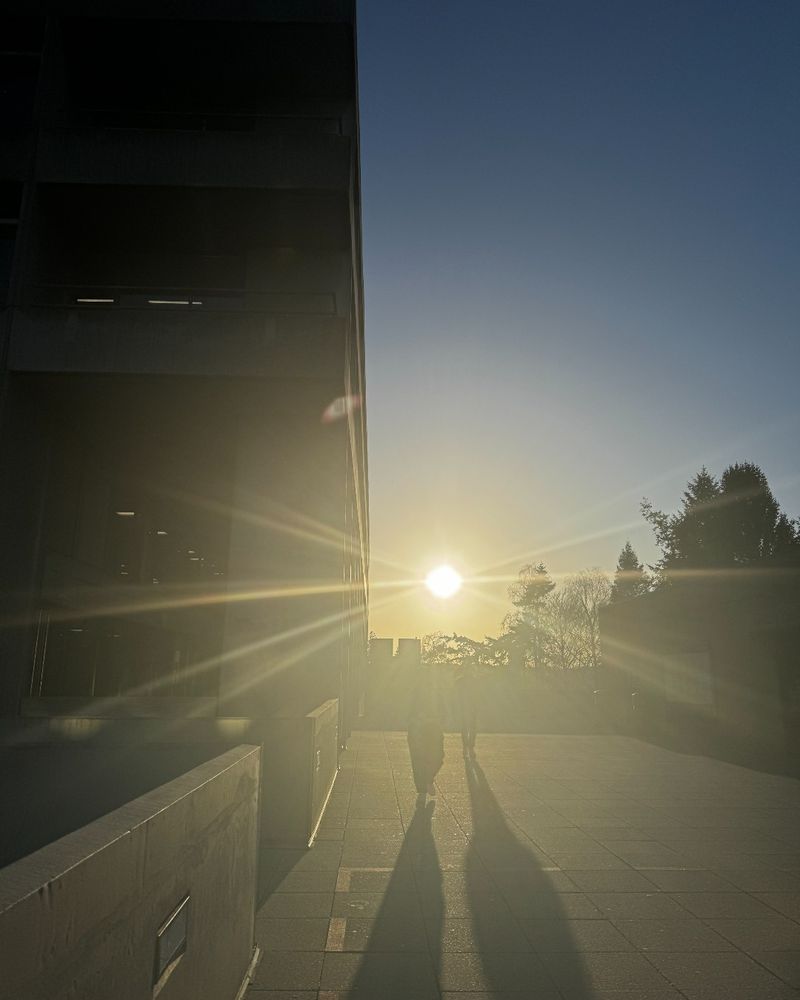
Sunset casting a long shadow of a person standing between modern buildings.

Two hands holding ice cream cones with coloruful sprinkles in front of the University of East Anglia building on a sunny day with a crowd in the background.

Sunset view featuring a vibrant sky behind the silhouette of a modern urban skyline with multiple buildings and a pedestrian bridge.

A sunny day on a university campus with people walking on a grassy area leading to modern buildings, including one with a unique, curved structure at the University of East Anglia
A campus for all seasons 💙
It's A-Level Results Day and we're open from 8am-8pm to answer your queries about Clearing: 01603 294952
Here's everything you need to know👇
#ALevelResults
14.08.2025 08:05 — 👍 8 🔁 2 💬 1 📌 2
Yes I put two typos in the title: it’s very hot. 🥵
13.08.2025 16:11 — 👍 2 🔁 0 💬 0 📌 0
Another great one! 👇 I know Benjamin and he's a stellar scholar!
13.08.2025 16:08 — 👍 1 🔁 1 💬 0 📌 0

The cover image is a black and white photograph of a protest led by the Campaign for Nuclear Disarmament in Trafalgar Square.
Cover reveal! “The People in British Literature: Belonging, Exclusion, Democracy”, ed. by Benjamin Kohlmann and me, out this December from CUP.
13.08.2025 15:52 — 👍 10 🔁 1 💬 2 📌 1
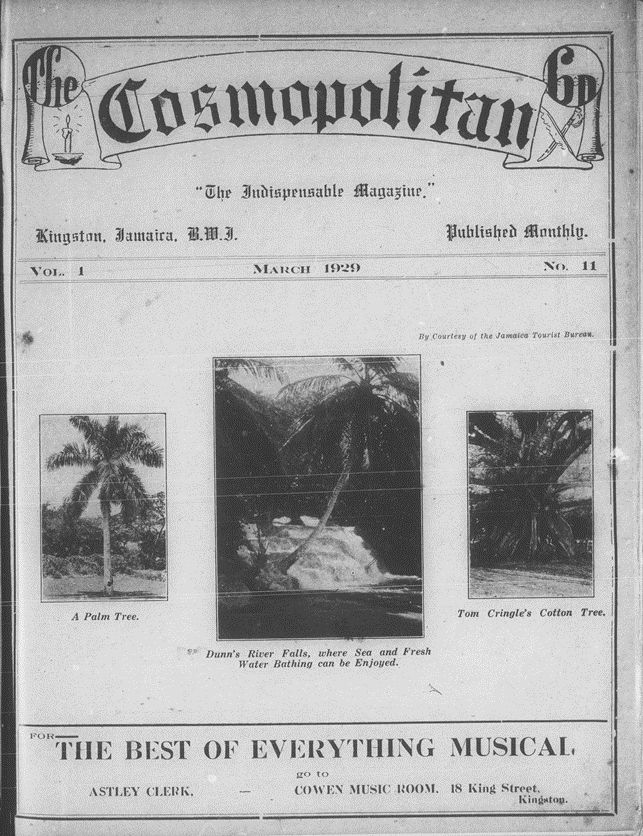
Further to this @thetls.bsky.social essay about Una Marson's early work as a publisher, the full run of Marson's 1920s/1930s magazine, The Cosmopolitan, is now freely available on the Digital Library of the Caribbean (@dlocaribbean.bsky.social): www.dloc.com/AA00114844/0...
12.08.2025 14:42 — 👍 5 🔁 7 💬 1 📌 0
Excited for this new OUP series on Literature & Politics! Paired authors tackling vital terms and topics of the day, starting with Amanda Anderson and @simoncd.bsky.social on *Humanities Theory*. Next up Doug Mao and @duncanbell.bsky.social on *Utopia*.
global.oup.com/academic/con...
11.08.2025 18:32 — 👍 8 🔁 1 💬 0 📌 1
Ah thank you! It was such an interesting and inspiring project to be involved in.
11.08.2025 10:55 — 👍 0 🔁 0 💬 0 📌 0
YouTube video by Jarman Lab
Declamations!
Declamations! is a short documentary that developed out of my @britishacademy.bsky.social mid-career fellowship on the politics of choral speaking. It documents a series of performances in Norwich, written by UEA students, inspired by Jack Lindsay's 1930s Mass Declamations. youtu.be/IY085tFQ7SM?...
31.07.2025 14:22 — 👍 9 🔁 2 💬 2 📌 0
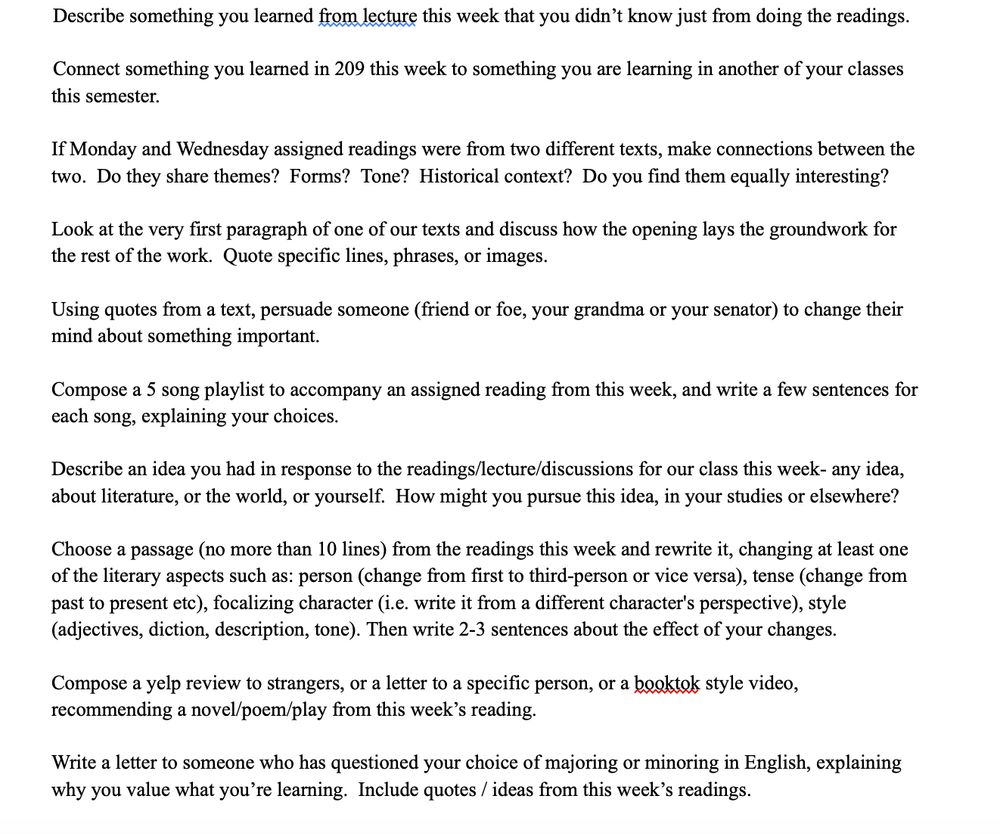
Describe something you learned from lecture this week that you didn’t know just from doing the readings.
Connect something you learned in 209 this week to something you are learning in another of your classes this semester.
If Monday and Wednesday assigned readings were from two different texts, make connections between the two. Do they share themes? Forms? Tone? Historical context? Do you find them equally interesting?
Look at the very first paragraph of one of our texts and discuss how the opening lays the groundwork for the rest of the work. Quote specific lines, phrases, or images.
Using quotes from a text, persuade someone (friend or foe, your grandma or your senator) to change their mind about something important.
Compose a 5 song playlist to accompany an assigned reading from this week, and write a few sentences for each song, explaining your choices.
Describe an idea you had in response to the readings/lecture/discussions for our class this week- any idea, about literature, or the world, or yourself. How might you pursue this idea, in your studies or elsewhere?
Choose a passage (no more than 10 lines) from the readings this week and rewrite it, changing at least one of the literary aspects such as: person (change from first to third-person or vice versa), tense (change from past to present etc), focalizing character (i.e. write it from a different character's perspective), style (adjectives, diction, description, tone). Then write 2-3 sentences about the effect of your changes.
Compose a yelp review to strangers, or a letter to a specific person, or a booktok style video, recommending a novel/poem/play from this week’s reading.
Write a letter to someone who has questioned your choice of majoring or minoring in English, explaining why you value what you’re learning. Include quotes / ideas from this week’s readings.
syllabus time, teaming up for the herculean efforts of reinventing writing assignments. here, some prompts for required weekly low stakes 250-500 word reflections/ process pieces that have proven relatively conducive to real writing in lit class. please share any similar suggestions in thread.
21.07.2025 12:14 — 👍 519 🔁 122 💬 47 📌 18
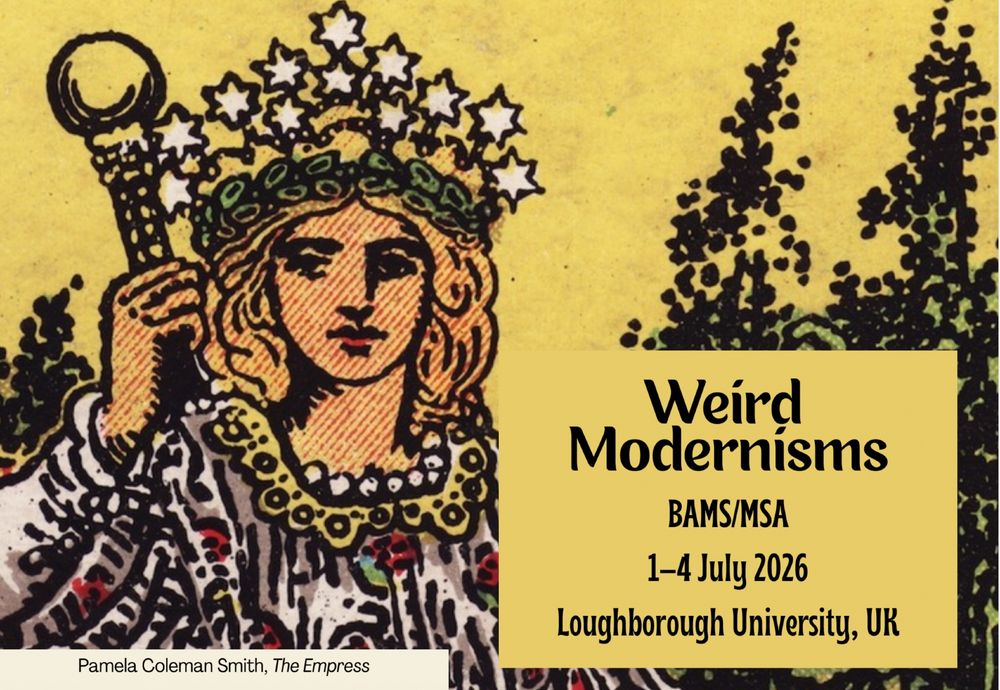
Tarot card image of the empress with a crown of stars. Text reads Weird Modernisms BAMS/ MSA 1- 4 July 2026 Loughborough University, UK
In 2026, the MSA Conference will look a bit different-- weird, even! That's because we're having a joint conference with BAMS @modernistudies.bsky.social in Loughborough, UK from July 1- 4, 2026. The CFP will be out soon! But in the meantime, please save the date.
07.08.2025 12:45 — 👍 68 🔁 41 💬 2 📌 4
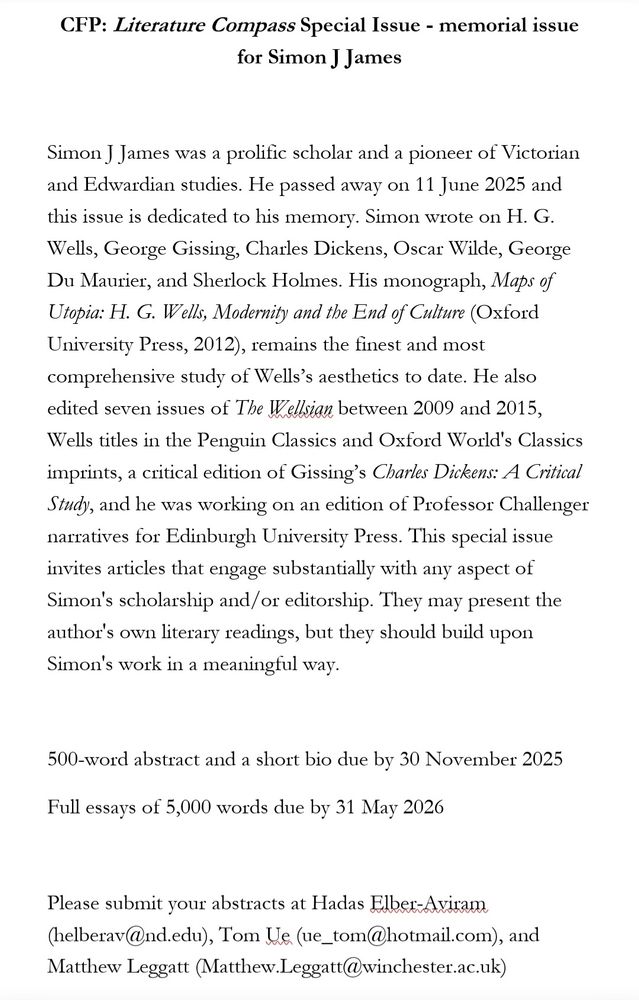
Please help me share the CFP for this Literature Compass Special Issue dedicated to the work of Simon J James and covering key Victorian and Edwardian writers like H. G. Wells, George Gissing, Dickens, Wilde, George Du Maurier, and Conan-Doyle on behalf of Hadas Elber-Aviram.
06.08.2025 08:49 — 👍 53 🔁 61 💬 1 📌 6
The street shows were supported by Jack Lindsay's daughter Helen, directed by Simon Floyd of the Common Lot, and m'colleague Steve Waters was dramaturg. The film was directed by Bartek Dziadosz of the Derek Jarman Lab - I hope you enjoy!
31.07.2025 14:22 — 👍 2 🔁 0 💬 0 📌 0
YouTube video by Jarman Lab
Declamations!
Declamations! is a short documentary that developed out of my @britishacademy.bsky.social mid-career fellowship on the politics of choral speaking. It documents a series of performances in Norwich, written by UEA students, inspired by Jack Lindsay's 1930s Mass Declamations. youtu.be/IY085tFQ7SM?...
31.07.2025 14:22 — 👍 9 🔁 2 💬 2 📌 0
Looks brilliant- can’t wait to read!
31.07.2025 13:46 — 👍 2 🔁 0 💬 0 📌 0
The replies to this are interesting about the power (and perils) of bluesky for writers (including academics). We write in a moment of media fragmentation, lacking clear rules about what to do (on- and offline), to engage readers in the topics that interest us. Many wise, encouraging thoughts here!
31.07.2025 13:44 — 👍 2 🔁 1 💬 0 📌 0
 27.07.2025 09:11 — 👍 1 🔁 1 💬 0 📌 0
27.07.2025 09:11 — 👍 1 🔁 1 💬 0 📌 0
Really a bad mistake to pitch education at 'jobs of the future' which you will almost certainly get wrong. What education gives is maturity, judgement, cognitive skills, trainability, flexibility - almost whatever the subject. For this reason 85% of grad job adverts don't specify a subject.
26.07.2025 13:21 — 👍 8 🔁 4 💬 1 📌 0
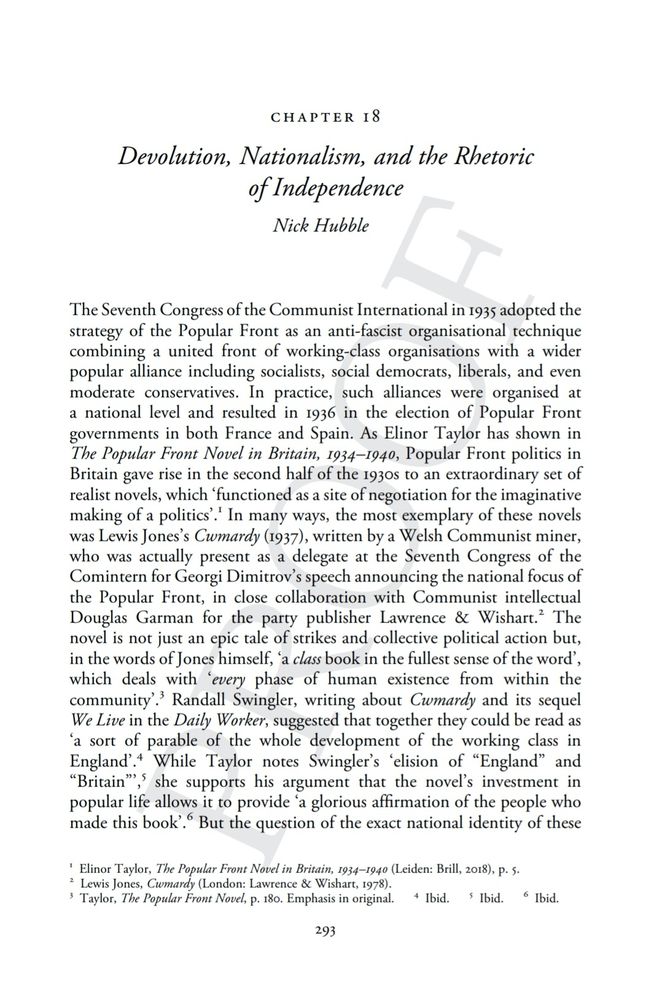
Proof of Chapter 18: 'Devolution, Nationalism, and the Rhetoric of Independence' by Nick Hubble. Text reads The Seventh Congress of the Communist International in 1935 adopted the strategy of the Popular Front as an anti-fascist organisational technique combining a united front of working-class organisations with a wider popular alliance including socialists, social democrats, liberal and even moderate conservatives. In practice, such alliances were organised at a national level and resulted in 1936 in the election of Popular Front governments in both France and Spain. As Elinor Taylor has shown, Popular Front politics in Britain gave rise in the second half of the 1930s to an extraordinary set of realist novels, which ‘functioned as a site of negotiation for the imaginative making of a politics’. In many ways, the most exemplary of these novels was Lewis Jones’s Cwmardy (1937), written by a Welsh Communist miner, who was actually present as a delegate at the Seventh Congress of the Comintern for Georgi Dimitrov’s speech announcing the national focus of the Popular Front, in close collaboration with Communist intellectual Douglas Garman for the party publisher, Lawrence & Wishart. The novel is not just an epic tale of strikes and collective political action but, in the words of Jones himself, ‘a class book in the fullest sense of the word’ which deals with ‘every phase of human existence from within the community’. Randall Swingler, writing about Cwmardy and its sequel We Live in the Daily Worker, suggested that together they could be read as ‘a sort of parable of the whole development of the working class in England’. While Taylor notes Swingler’s ‘elision of “England” and “Britain”’, she supports his argument that the novel’s investment in popular life allows it to provide ‘a glorious affirmation of the people who made this book’. But the question of the exact national identity of these people remains unsettled.
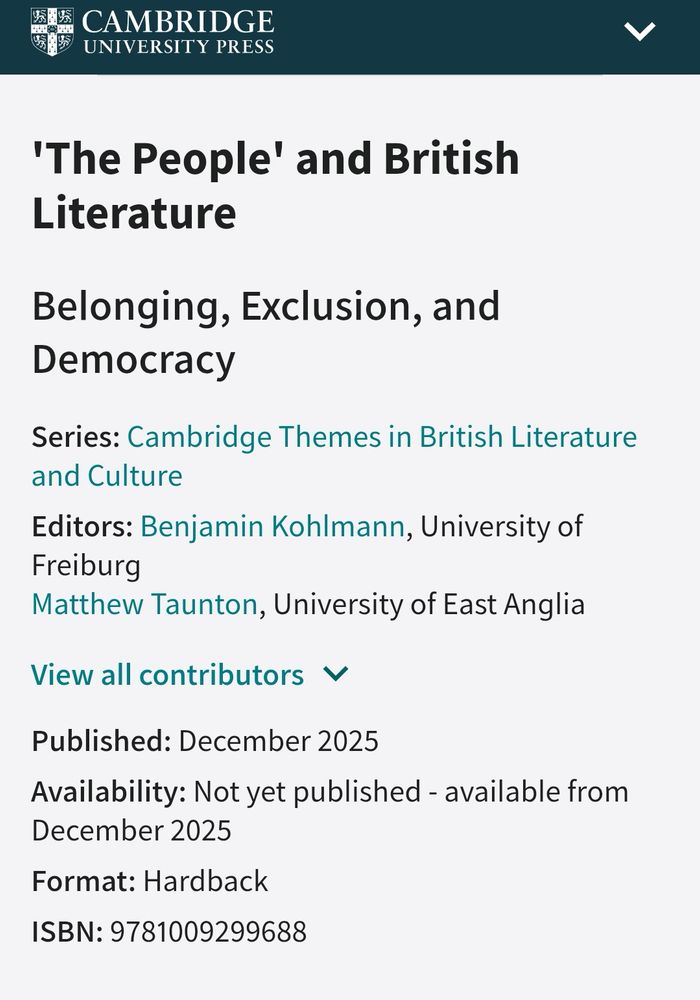
Screenshot from Cambridge University Press announcing a new book, 'The People' and British Literature: Belonging, Exclusion and Democracy, edited by Benjamin Kohlmann and Matt Taunton, due out in December 2025.
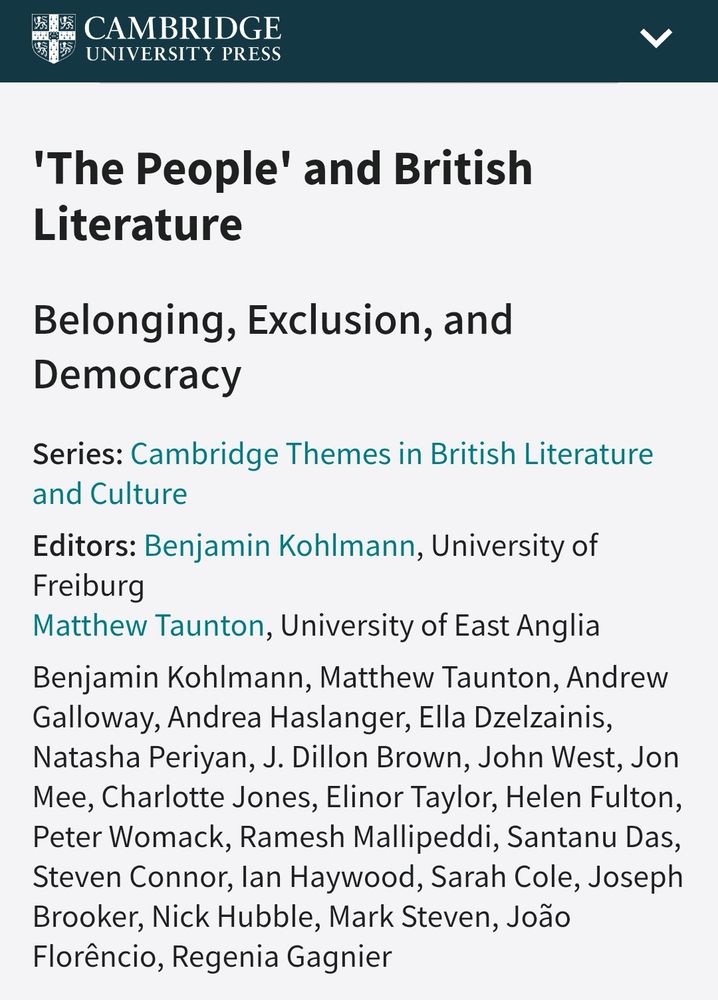
As previous image but with list of contributors: Benjamin Kohlmann, Matthew Taunton, Andrew Galloway, Andrea Haslanger, Ella Dzelzainis, Natasha Periyan, J. Dillon Brown, John West, Jon Mee, Charlotte Jones, Elinor Taylor, Helen Fulton, Peter Womack, Ramesh Mallipeddi, Santanu Das, Steven Connor, Ian Haywood, Sarah Cole, Joseph Brooker, Nick Hubble, Mark Steven, João Florêncio, Regenia Gagnier
Proofs of my chapter 'Devolution, Nationalism, and the Rhetoric of Independence' from Benjamin Kohlmann and Matthew Taunton, eds, 'The People' and British Literature: Belonging, Exclusion and Democracy, Cambridge University Press, December 2025. #ProofingTime #AcademicSky #Cymru
#Scotland
23.07.2025 10:16 — 👍 7 🔁 1 💬 0 📌 0
Ah sounds great! Looking forward to that- hope you have a good break first though. Cheers 🍻
23.07.2025 14:41 — 👍 1 🔁 0 💬 1 📌 0
Official account for author Russell Hoban (1925–2011), author of Riddley Walker, Turtle Diary, The Mouse and His Child, Frances the Badger, etc. https://russellhoban.org/
Maintained by:
@daveawl.bsky.social
@thoughtcat.bsky.social
Research Fellow @ies-sas.bsky.social, Bougie London Literary Woman, cat concierge. Book on 18th-century women's letters forthcoming from Chatto & Windus. natashasimonova.com
Acquisitions Editor, Grove Music Online/Oxford University Press. Also edit for Open Space Magazine & Perspectives of New Music. Book contracted w/ @ucpress.bsky.social on the Princeton composer-theorists w/in Cold War modernism. #Arsenal. Views my own.
a guy who hangs around universities and opera houses
We are Cambridge University Press & Assessment. We are focused on meeting the needs of our learners, authors and customers by bringing research, teaching, learning and assessment together.
Learn more: cambridge.org
Literary critic & historian; socialist; education trade unionist; sinner who has fallen short (the throat an opened grave!); listener for the murmur of underground streams, looker for a limestone landscape.
Lawyer, author, EFF's first hire, Godwin's Law creator (he/him). Retweeting!=endorsing. I tell jokes here, mostly. My opinions here don't necessarily represent any employer or any client. You may have known me as @sfmnemonic on Twitter.
Teller of small stories. Professor of history at Birkbeck. Rider of bikes, grower of vegetables, Brook custodian & friend to five ducks. Townie Cantabrigian. Eternally homesick Newfoundlander; researching the island's history & the legacies of empire.
A series of free #materialculture events at @warburginstitute.bsky.social | Theme for 2024-25: Work v. Play | Posts by convenor @louisamckenzie.bsky.social
https://warburg.sas.ac.uk/whats-on/material-world
https://www.johnconnorlikeintheterminator.com
For alerts when something new drops: https://forms.gle/neT79ZHa9BPjGh2m9
Soc of Work + Platform Labor | U of Edinburgh | Created MSc Digital Sociology | @jcultecon + Platforms & Society | CAHSS Digital Lead | Critical Data Studies @ EFI
Writing: Enchanted Entrepreneurs: Media, Work, and Meaning in the Spiritual Marketplace
Professor, English Lit. 18th-20th centuries- Modern manuscripts | Collaborative writing | Literature & medicine | Gender | Intertextuality - Director of LEA - President of the Programme in Foreign Languages and Literatures
Green Party Leader (England & Wales)
London Assembly Member.
Chair of London's Fire Committee.
🏳️🌈
https://podcasts.apple.com/podcast/id1837201724?i=1000724643828
💚 Real hope. Real change.
greenparty.org.uk
Promoted by Chris Williams on behalf of the Green Party, both at PO Box 78066, London SE16 9GQ.
Director of human rights consultancy Stand For All. Specialist in international refugee law, human rights policy, comms and advocacy. Also posting about being autistic and LGBTQIA+ rights. Non-binary (They/them). My views, no-one else would want them.
Academic/Writer - History/Politics/Criminology - British, Australian and southern African (plus transnational) history - he/him - top 2% researchers 2024 (Stanford/Elsevier rankings) - views own - cult classic, not best seller
English prof in the prairies | Shakespeare | Austen | Food | Cults and Coercive control | Pedagogy | Unions | Anti-Fascist | Anti-Genocide
Director of Policy at Stonehaven. Ex BEIS. Energy geek. All skeets in a personal capacity. @adam_grant_bell on the bird site













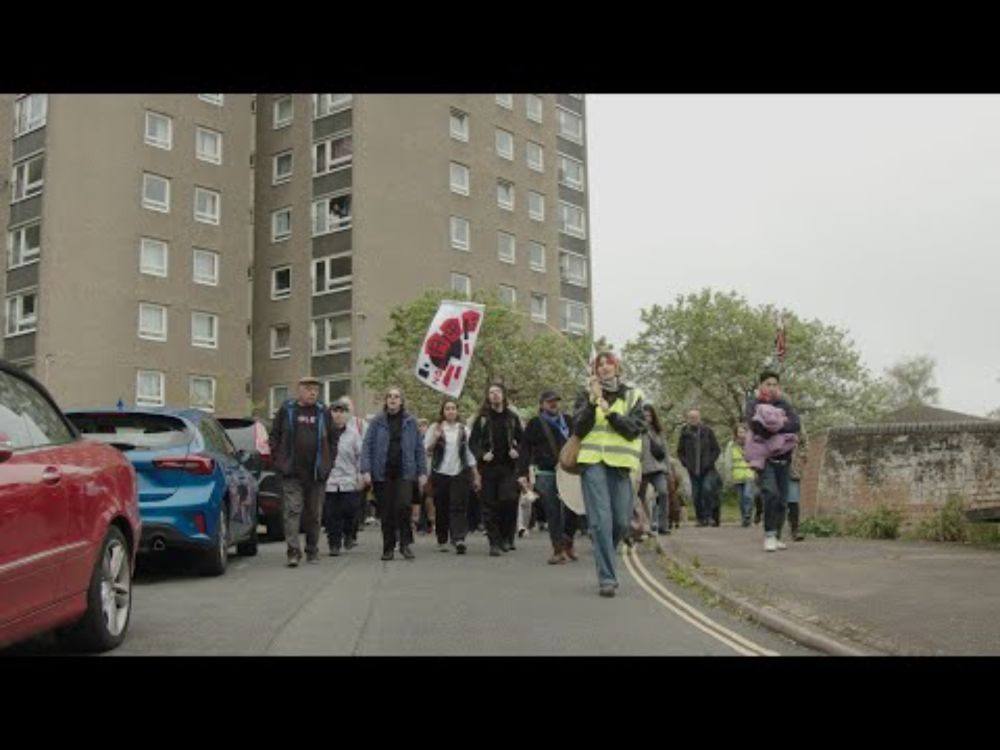




 27.07.2025 09:11 — 👍 1 🔁 1 💬 0 📌 0
27.07.2025 09:11 — 👍 1 🔁 1 💬 0 📌 0


